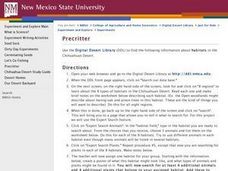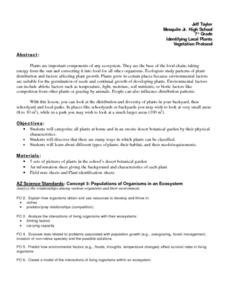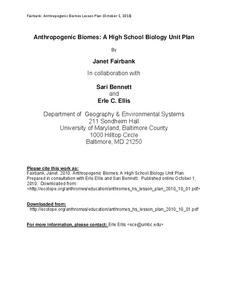Curated OER
Research: Habitats in the Chihuahuan Desert
In this desert habitat worksheet, learners follow the links to research information about the Chihuahua desert. Students fill out the graphic organizer with facts about the habitat, animals and plants of this region.
Curated OER
Animal Habitat Dioramas
What a better way to have learners show what they know than with a diorama? Kids research an animal, its habitat, ecosystem, and environment in order to create a three-dimensional diorama. Have older children write a short paper on their...
Curated OER
Deserts: How Do You Define One?
Second graders identify what constitutes as a desert by reading a habitat checklist. In this environment lesson plan, 2nd graders read a nature website to discover facts about the desert and where they are located. Students utilize art...
Global Change
Impact of Climate Change on the Desert Pupfish
A fish that lives in the desert? You and your class can meet the desert pupfish as they examine its habitat, the role humans play in diminishing water supplies, and how climate change might impact this fishy friend. There are four short...
Curated OER
Making a Mini Worm Habitat
Students explore the process of converting organic waste into usable fertilizer. They observe how living and nonliving things interact with one another by making a mini-worm habitat.
National Wildlife Federation
What's Your Habitat?
How are third graders like rabbits? They both live in habitats and require food, water, and shelter to survive! An educational science lesson encourages your learners to think about their own habitats and survival needs, before comparing...
Project WET Foundation
Investigate Fresh Water
It's all about freshwater in this water interactive! Users navigate through freshwater habitats such as lakes, rivers, and wetlands, taking note of the animals that live there. They also look at a desert habitat for comparison. Learners...
Curated OER
Life in Sahara
Students explore the geography of the Sahara region of Africa and identify characteristics of a desert habitat. They explore the culture of the people living there and how it has adapted to desert life.
Curated OER
Unit Plan Template
Learners research the adaptations of desert animals and build their research skills. In this the adaptations of desert animals activity, students describe major factors that desert animals have on their habitat. Learners explore how to...
Curated OER
Desert Tortoise Adaptations
Students observe the Desert Tortoise in its natural surroundings. For this adaptations lesson, students study and take pictures of an animal in its habitat, then design a PowerPoint which addresses adaptations, biodiversity, and threats...
Curated OER
Desert Discoveries
Students correspond with Israeli students from Jerusalem by email as part of a study on desert and semi-arid regions. They conduct background research and become proficient in the use of electronic mail.
ARKive
Adaptations for Movement
What animals are best suited for moving around a rainforest, or a desert? Design your own animal species based on a particular habitat, focusing on the characteristics it will need for optimal movement. Great as a group lesson or...
Curated OER
Habitat Unit - Day 2
Learners explore abiotic factors that affect habitats. After a class lecture, students work in groups to answer questions about plant tissue, production and growth. They share answers, complete a crossword puzzle, and create a habitat...
Curated OER
Habitats: Cactus Hotel
A reading of Brenda Z. Guiberson’s, Cactus Hotel, launches a study of animal habitats. Working with parent volunteers or teacher aides, groups travel outside the classroom to select a habitat, take digital pictures, and incorporate the...
Curated OER
Habitats of the World
Students complete a unit of eighteen lessons that cover climate, geography, location, plants, and animals of each of the five habitats. They are also introduced to habitat destruction and discuss ways to protect the environment. They do...
Curated OER
U.S. History: Antebellum Heroes and Villains
Eighth graders research and write reports on key figures of the Antebellum Period. The projects also include pictures, bibliographies, and timelines about their assigned figure. In addition, 8th graders present oral reports to classmates.
Curated OER
Exploring Habitats
Students analyze the difference between the human habitat and the different habitats of animals in the six lessons of this unit. The students' imaginations and literature are used to explore important aspects of the living environments...
Curated OER
Habitats of the World
Students discover that the Earth supports many different animal habitats. For this habitat lesson students research different habitats of the world. Students show how the animals in their habitat are adapted.
Curated OER
Anthropogenic Biomes
If you teach a man to fish, he will never go hungry—or he will overfish and permanently damage the ecosystem? Address the traditional biomes as well as the human-included ecosystems and contrasts the biotic and abiotic factors in each....
Curated OER
Rainforests: What Are They?
Second graders investigate rain forests by reading a habitat checklist. In this environment lesson, 2nd graders read the book The Great Kapok Tree, and discuss what characteristics make up a rain forest. Students explore a habitat...
Curated OER
Lonesome Linda
Students analyze the create of Loma Linda. In this Western expansion lesson, students look at the development of a resort in the desert and how a town is begun.
Curated OER
Aquatic Exotics
Students identify and describe the aquatic exotic species found in Illinois. Using the internet, they research the species origins and discover their effects on native species in the area. They discuss how appropriate it is to introduce...
Curated OER
Biomes -- Part II
Learners use the internet to gather information on the biomes of the world. They identify the climate and unique characteristics of each biome along with any threat to them. They create their own campaign to preserve wildlife.
Curated OER
Overpopulation
Students examine population growth and how it impacts our environment. In this population lesson students identify the causes and consequences of overpopulation.

























